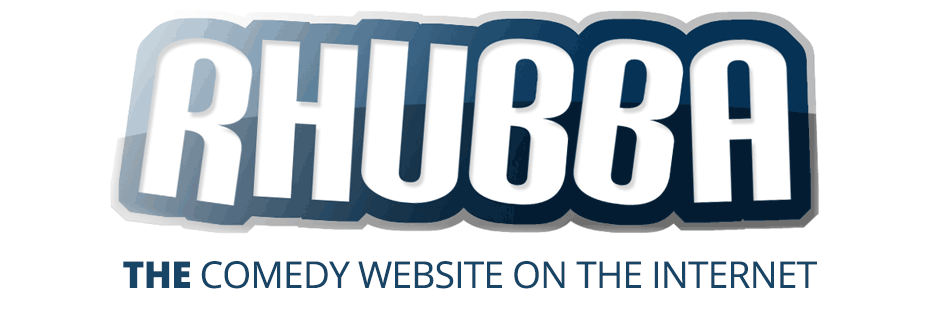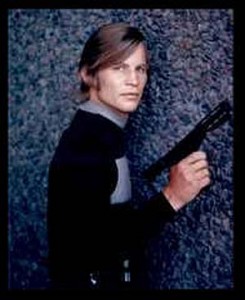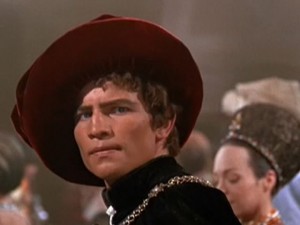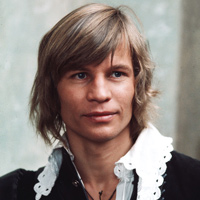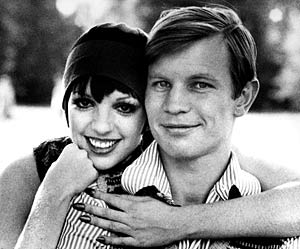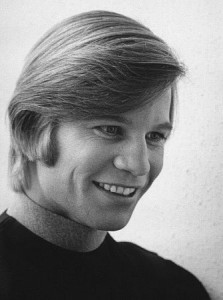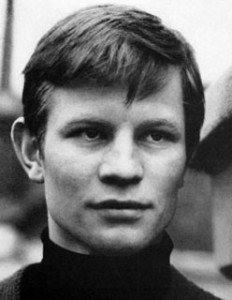MICHAEL YORK
by Nicholas Hughes
Soho, 1970.
Assembled in one of the more prominent British film industry buildings are the best young actors the UK has ever produced. Anthony Hopkins is entertaining Ian Ogilvy and Timothy Dalton with his Richard Burton impressions. Nicky Henson is flicking rubber bands at Ray Brooks and somewhere at the back Jon Finch is scribbling something obscene on the wall. The room is bursting at the seams with this array of talent.
The door to this meeting room flies open and a middle aged man bedecked in a Mr Fish suit and a Beatle haircut strides in. If he’s not the top man in the British film industry, he at least is just below the summit. He’s gotten to know these young actors well, he got them some of their best roles to date, but he doesn’t seem pleased to see them today. He stands at the front of the group.
“Thank you gentlemen for all showing up today. I don’t have much time and what I’m about to say you won’t like so I’ll keep it short. Basically the British film industry has gone tits up…pardon my French…it seems the Yanks didn’t take to either Charge of the Light Brigade or Performance…yeah, I know, crazy eh? And they lost a shit load of money on Hello Dolly as well. Don’t worry Crawford, they’re not blaming you. So they’re pulling out of the UK as of…well, right now. What that means is that we’re going to go from a production slate of about 100 movies a year to…let’s see…carry the two…subtract the number I first thought of….ah, 3. So that means there’s no money for us to make all those lovely expensive projects we dreamt of. It also means that you’re going to have to scramble for whatever roles are left: For some of you that will mean television. Some of you will get work in Europe and there’s always horror films a-plenty before you have to resort to appearing in sex-comedies. If all else fails there’s theatre, provincial or otherwise.
But I’ll be damned if I’m going to let the British leading man die here: Hollywood has room for one young, dynamic British male actor…just one. Connery and Caine are holding the fort over there but they’re not getting younger and…well…they’re a bit regional accented, if you know what I mean. What we’re going to do is send one of you; young, dashing and with impeccable diction, over to L.A. and from there you will remind the world what a British leading man looks and sounds like. Fly the flag…for about a decade. But who to send? Well, that’s up to you: In front of you is a piece of blank paper and a pen. Each one of you has to write a name of the actor you think would be best placed to thrive in Hollywood and represent each and every one of us over there. The only catch is that you can’t vote for yourself…sorry, Mower.
The executive sits down and for the next few minutes the room goes quiet except for the sound of scribbling. At the end, the papers are placed in a box and someone counts the votes. One name emerges as a clear winner: Michael York.
If any young British actor emerged out of the Sixties and Seventies with his reputation not only intact, but enhanced, it was Michael York. Whilst others showed moments of brilliance, most ended up as cases of what might have been or instead, like Anthony Hopkins, get delayed recognition. Michael York was perhaps the one British star to emerge in the late Sixties who was still a star when the Eighties rolled along.
Why him, though? What was it about Michael York that led to such international stardom that got him A list roles in Hollywood movies when others from the UK tried by just fell short? And what makes people instinctively like him as a performer? Because they do…Michael York is one of those actors that everyone seems to just like…Roddy McDowall and Gene Hackman also fall into this category. As we’ll see, that likeability even references itself in his movies.
So, this isn’t going to be a cranked out potted biography. Oh no, why lumber myself with that simple task when there’s a mystery to unravel here: The secrets of Michael York’s success, no less. Hopefully it doesn’t involve ritual sacrifice and doomsday prophecies.
Let’s start with the physical specimen known as Michael York. There’s that famous face: Broken nose, thick lips, big cheekbones, a mop of blonde hair (either shaggy or immaculately side parted…no other options) and piercing blue eyes that flash with varying degrees of intensity from slit holes. He looks part English gent, part Nazi officer and part Slavic. I haven’t described the most handsome man there and yet York was a heart throb, a pin up and considered very handsome indeed. Somehow those features described come together as a whole to create a dashing, handsome lead. Then there’s his body; lean and athletic without being muscle bound, which is so often prominently displayed on screen. York was never afraid to get his kit off and show off his chest for a film and there is one of our first clues, albeit in an unlikely source. York is an English actor not afraid to take risks or be shy on camera.
It is said that British actors, being stage trained, are more comfortable with dialogue than being a physical presence on screen but York isn’t like that. We’ll get to his vocal qualities in a moment but what he is adept at doing is using his physical presence for maximum effect. Like I said, his eyes are intense if you watch his close ups: It’s as if he’s using them to look into the mind and soul of whoever he’s talking to on screen. Watch him in Logan’s Run, especially when he meets Jessica for the first time. He’s propositioning her for sex but his eyes are interrogating her, trying to find out just what she’s about. That looks becomes scepticism when he is given his mission from the city’s computer. Then, in Jesus of Nazareth, his eyes burn with intensity as John the Baptist which I think was spot on casting. Right from the start of his career in films such as Romeo And Juliet or The Guru, you’ll see how he uses his intense stare to cut down enemies, seduce people or to interrogate them. York, in short, understands movie acting and the little things that can be so effective on the big screen.
Then we get to his voice; one of his most recognisable traits. A velvety baritone with the hint of a parody of upper crust British vowels (one minute, it’s derring do in “Riddle of the Sands” and the next it’s Sir Basil Exposition), his is one of the most distinctive voices in movies and yet I haven’t found one person who can impersonate him! I’ve tried…and failed. I doubt it can be done. You try saying “you’ve said enough, you’re beautiful, let’s have sex” in his voice…only he can get away with it as I’ve learned to my cost.
But these things only hint at what York is best at in the movies and that he is a fantastic leading man. What qualities mark out a leading man? Sure, there’s fame, there’s charisma (which came to the fore in the Musketeer movies) there’s a look but a really good leading man in movies knows when to step centre stage to dominate scenes and when to step back and let his co-stars shine. A good leading man doesn’t get insecure about their status on the set; they know what they’re bringing to the party. You look at York in the Musketeer movies: He’s got, arguably, the most famous role in D’Artagnon and he plays the role better than anyone before or since but he knows when Oliver Reed needs to take over, when Roy Kinnear has to steal a scene off him (and he’s very gracious about letting him do that) and when Raquel Welch just has to be Raquel Welch in all her glory. York’s always been great with his female co-stars and what an array he’s had to work alongside with: Liza Minnelli, Raquel Welch, Barbara Carrera, Susannah York, Lynn Redgrave, Elke Sommer and Jenny Agutter…the latter an actress he shares a remarkable chemistry with.
If you want one single movie where his star power was cemented, then look no further than “Cabaret”. There he is, sandwiched (and sometimes literally if you’ve seen the movie) between Liza Minnelli and Joel Grey eating up the scenery, dazzling with their music and dance and decked out in a period version of an Anne Summers party. You’ve got one of the two Helmuts…Griem or Berger; I can never tell which one was which…Nazis, Bob Fosse numbers and yet York is never fazed or overwhelmed by the proceedings or his incredible co-stars. In fact, York becomes the glue that holds the whole thing together. “Cabaret” is based on a novel called “I Am A Camera” and that is what York is playing: A human camera who serves both as a foil to the other characters and as an everyman the audience can identify with. If you think that’s not a hard role to play, just think about Michael Beck in “Sophie’s Choice”: He’s meant to play the same kind of role but is overwhelmed by Meryl Streep and Kevin Kline. No, York not only holds his own in “Cabaret”, he excels and from that moment on international stardom was virtually guaranteed.
For the next 8 years, York capitalised on his stardom to great effect…well, mostly. The Musketeer movies were a triumph of all-star casting and he remains the definitive D’Artagnon. “Conduct Unbecoming” was another star romp with York in the central role, again never daunted by his seniors in the British acting fraternity. Then there was “Logan’s Run” where sexy and dystopia combined in a way that has never been achieved before or since and, well, there was “Lost Horizon”. We can’t all pick winners. By 1977 York’s name and presence had cache to the extent that he could be cast as himself in “Fedora”; where he becomes the object of infatuation for the title character. What other actor at that time would be brave enough to be themselves in a, frankly, bonkers movie?
To round off the 70s, York was perfect in the Edwardian spy movie “The Riddle Of The Sands”. In some ways, that movie was the last hurrah of the upper crust British hero on the big screen….with the exception of James Bond but then 007 was always a bit different. You had York, Agutter and a baton being passed from him to his next generation Flare Player, Simon McCorkindale. Surely the holding job of being Britain’s premier young leading man in the 1970s was done and the 80s would be the time of actors like McCorkindale and Anthony Andrews? It was, but in a very limited way.
By 1980 there was a real life riddle of the sands: Namely how they shifted in the new decade and would York, like the rest of his acting generation, be able to cope with what lay ahead? At this point he jumped ship from the UK to the United States and Europe and threw himself into big budget TV drama mixed in with European movies. It was a shrewd move as the kinds of movies he was known for just weren’t going to be made anymore. Counter culture was out, dashing British heroes were on their way out and York’s penchant for ambiguous and intense heroes just weren’t the flavour du jour in either Britain, which couldn’t really afford to make the films he was good in, or America, where a new kind of beefcake hero that fitted the Ronald Reagan era were what was wanted. But prime time television was a fertile ground to find roles in.
American TV was well into the era of the glossy, big budget TV mini-series with production values to rival movies and this was where York extended his high profile career. From adaptations of classic novels such as “The Master of Ballantrae” to playing various Nazis, good Germans and European character parts which required an accent, York kept himself on top of his game in the 1980s and beyond.
It’s hard to think of him at the age of 70 after keeping his youthful looks for so long. An actor where there is no scandal attached to him, who genuinely loves his work and the art behind it, a well-read man who is a wonderful raconteur without ever being showy or egotistical…York is admired and liked in a way few in his profession who have risen to his heights has done. If there is one thing that is disappointing about him it is that he has never received the gongs and awards that are surely his due. Perhaps it’s because people, producers, audiences and fellow actors like working with him so much that they’ve forgotten to honour him. And which performance do you single out for an award? The one award that should be given to him is the Queen’s Award for Industry: For consistently exporting a quality product in a competitive global market. But there’s no art in that, and that is what he works for.
So there he is; Michael York, the big winner of the Flare Players. The man, who emerged, took centre stage and prospered. Couldn’t have happened to a nicer guy.
Michael York stands and smiles to a standing ovation in front of his peers: He’s genuinely touched and humbled. It’s not his way to make a meal of a situation like this but he realises the weight placed on his shoulders and gracefully accepts it. He says thank you from his heart to each and every one of his fellow actors but then apologises for not staying longer: He has a flight to catch.
